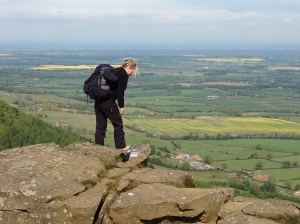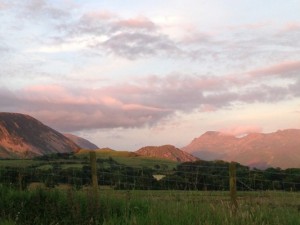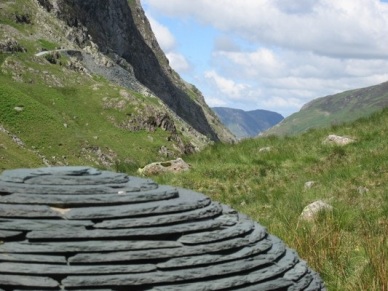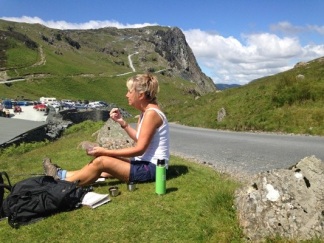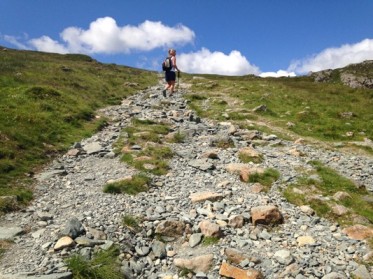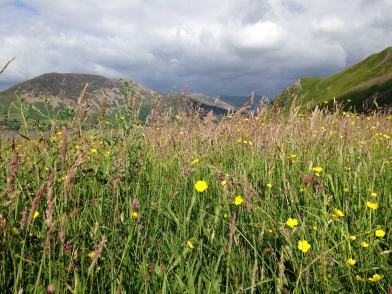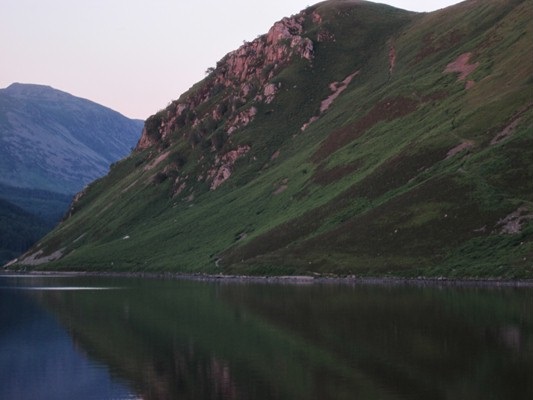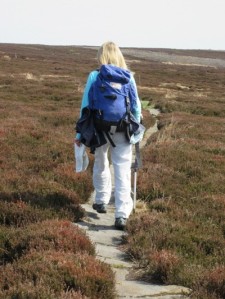 It is 15 months since I wrote, on the eve of beginning this Coast to Coast crossing, ‘bring it on change’.
It is 15 months since I wrote, on the eve of beginning this Coast to Coast crossing, ‘bring it on change’.
I wrote from a belief that our lives were somehow on hold, strangled into relentless routine by becoming full-on carers for the second time. I wrote from a sense of wistfulness for the other times we had walked this way: when the four years it took in each direction were accompanied by profound shifts in both our lives. As the scene moved from sea cliff and lofty moorland, through soft dales to soaring fells, so our circumstances moved too.
Secretly – because of course it makes no real sense – I believed that it was our walking that somehow forced the change. That each step towards west or east coast sent a signal to the universe that it needed to do its part. To reward our physical efforts by rearranging the landscape of our lives.
I quoted, in the very first post of this blog, Sarah Ban Breathnach’s words in her book Something More, “There are three ways to change the trajectory of our lives: crisis, chance and choice.”
But what this new Coast to Coast was really about, I think, was calling out to the universe again; asking it to step up one more time in return for Shushie and I doing our part. We had both reached a point where it was hard to see quite how life could go on as it was. We were exhausted, lost, frustrated, and in denial about some of the nastier emotions we sometimes felt. I’d labelled the small breakdowns I was experiencing as burnout. Shushie hinted at something even darker.
fledging
It wasn’t only about having to accommodate the caring in already busy lives, though there were days when I wanted to stamp my foot like a child and scream how unfair it was. Unfair on us, who had already spent five years in our forties caring for an uncle who had been very little to us when he was well, but so little to other people too that there seemed no-one else to take on his care. Unfair on me, who, in the same week mum was felled by a stroke, was looking forward to the first child fledging -beginning a gap year in Australia which ought to have heralded the first small promise of the freedom of being an empty nester.
 Most of all, unfair on our mum, one of the strongest women we knew, whose daily round of visits to sick friends, day centre, lunches, outings and quiz nights, involved walking – marching in her case – miles every day. It was inconceivable that someone so fit, so determined, so stubborn, might be stopped in her tracks when for 78 years nothing and no-one else had been able to change her course.
Most of all, unfair on our mum, one of the strongest women we knew, whose daily round of visits to sick friends, day centre, lunches, outings and quiz nights, involved walking – marching in her case – miles every day. It was inconceivable that someone so fit, so determined, so stubborn, might be stopped in her tracks when for 78 years nothing and no-one else had been able to change her course.
Please understand, I know that there is nothing special about our situation. Other people care. Some of them care more and better than we do. Other people – including mum perhaps – have much more to deal with. But we can only be us and experience our own lives. And all of this was happening to us at a time when we’d been led to expect life should be opening up. When the long, tough years of making and breaking relationships and hearts, of bringing children through their own, significant challenges, of juggling demanding jobs along with it all, and just, well, trying so damm hard to get it right for everyone, ought to have been levelling out, like the jagged peaks and deep valleys of the Lakes, melting into the gentle green cushion of the Yorkshire Dales. We were due that.
The big ‘c’
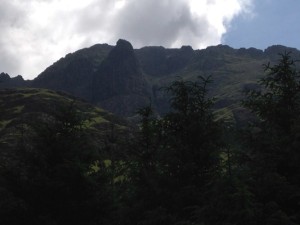 So now Shushie and I were pounding through Ennerdale Forest in sunshine, as conscious of the perfectly delicate stems of pink orchid as we were of Pillar’s sharp outline towering above us like a tombstone that, even on this summer’s day, remained always in shade, dark and unknown.
So now Shushie and I were pounding through Ennerdale Forest in sunshine, as conscious of the perfectly delicate stems of pink orchid as we were of Pillar’s sharp outline towering above us like a tombstone that, even on this summer’s day, remained always in shade, dark and unknown.
We were one day and no more than 20 miles from the end of a walk that had taken us half a year longer than we’d expected. The first ‘c’ – crisis: Shushie’s father in law suffering a massive stroke too; mum’s pulmonary embolism followed by the breast cancer becoming so aggressive she needed a mastectomy; and other even less explainable crises involving close family and friends that wholly blindsided us but do not belong on this blog.
The universe had indeed stepped up, with a wry smile on its face, and said ‘you think you know what you want but I know better so here you are: have more of the same and see what you make of it’.
Great joke universe.
Choosing life
Here is what we made of it.
“Doing this walk again saved my life,” Shushie says as we soak up the sun and the scenery.
I wait; want to know that she doesn’t mean she thought of ending it.
“Many times I felt myself teetering on the edge of a black hole. I don’t mean I’d have stepped into it, not that. Getting seriously ill, something I wouldn’t recover from, going out of my mind. It was there, waiting for me, so many times.”
Shushie and I have always shared everything but we never talked about that until this moment. It was her darkness.
“What made the difference was realising that I am just doing too much caring. I care for mum, I care for Maurice and for Pud caring for Maurice. And then I go into work and people want more of me. They want me to care about them and I do because I can’t not. That’s who I am.”
“Yes, you are wholehearted about everything. I see that,” I tell her. “So..?”
A bee buzzes busily close by, frantic to collect the nectar it needs while the rain is absent.
“I’ve thought about this and I’m clear I don’t want to stop caring for mum. And I don’t want not to be able to help out with Maurice and be there for Pud. So I need to stop having a job that is also about people needing me all day every day and me having to give out the whole time.”
“Over-caring.”
“Yep. I just want a happy job. Something I can go to and leave behind afterwards, working with people who are well for a while. Not for ever, but for now.”
It is not a big revelation. We have spoken of it together recently, and there are no crashing chords as in a momentous turning point to accompany Shushie’s words; her decision to leave behind a career of almost four decades. But it is quietly significant, this moment of the third ‘c’ – choice, where Shushie is choosing to save her own life by recognising and honouring her own needs.
“And you?” she turns to me. We are on a roll now, rocking through these sunlit woods, footsore yet also lighter than we’ve been for so, so long.
“When we started out, and it’s not easy to admit, I suppose thinking about what might happen to change things, I meant us no longer being carers.” I don’t go so far as to use the D word – mum’s death – just as Shushie didn’t use it when we were actually skirting around the subject of suicide.
“I mean I thought the shifts, whatever might happen, would be in the physical world. In our circumstances. When actually what’s changed is much bigger and more significant than that.”
It’s hard to find the words.
“What’s changed is in my mind, all the things that have fallen away,wanting and expecting everything to be a certain way. I don’t know how it happened but it’s as if I’ve let go; as if all my resistance to what’s going on has just melted away.
“It’s what I teach,” I say to Shushie. ” That so much of our pain, our suffering, comes not from what happens but from what we think about what happens.Fighting ‘what is’.”
Loving what is
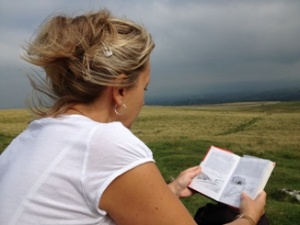 I can’t pinpoint the moment the shutters in my mind simply gave way under the pressure of the years, like a rotten shed collapsing in the merest breath of wind. Perhaps the week I spent at Serenity Retreat in Greece, leading other people in healing their lives but, as always, learning so much from them. Hearing myself speak the words that changing our thinking is changing our lives, and really hearing them. Coming home and changing my diet for healthier choices, allowing myself to sleep longer, shedding some work commitments, even saying ‘no’ once or twice. Like Shushie, understanding that survival means caring for my own needs too.
I can’t pinpoint the moment the shutters in my mind simply gave way under the pressure of the years, like a rotten shed collapsing in the merest breath of wind. Perhaps the week I spent at Serenity Retreat in Greece, leading other people in healing their lives but, as always, learning so much from them. Hearing myself speak the words that changing our thinking is changing our lives, and really hearing them. Coming home and changing my diet for healthier choices, allowing myself to sleep longer, shedding some work commitments, even saying ‘no’ once or twice. Like Shushie, understanding that survival means caring for my own needs too.
What I can say is that choosing not to fight ‘what is’, deciding to accept the way things are, has brought me more peace than I have known for more than a decade. I hear Byron Katie‘s voice gently asking the simple questions in her book Loving What Is: Is it true?
Is it true that all of this is hard? Sometimes, yes. Certainly every time I have the thought and repeat the thought that being a carer is hard I make it harder for myself.
Can you be sure it’s true? No, I can’t. Because when I let go of the thought that it is hard there is room for me to think it is a privilege to give love and receive gratitude, to be partnering the sister I love with all my heart in this caring and loving, to spend soft time with our childlike mum when all our lives it was hard and she was hard.
How do you feel when you think the thought that it is hard, Byron Katie asks with understanding? Resentful, wrung out, exhausted.
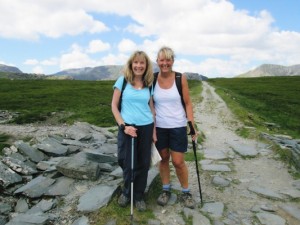 Who would you be without the thought?
Who would you be without the thought?
I look at Shushie, glowing in the sunshine. At the trees reaching skywards, but letting in light pools to the soft green forest floor. At the felltops etched sharp against the blue skyline. We can taste the sweet air. Nearby, the beck is flowing down the valley floor, finding a way between boulders smoothed by the years, towards the silver lake and beyond, the sea we will reach tomorrow. Every optimistic wildflower is a jewel flanking the path which continues wide and straight and bright ahead.
It has all been here, this beauty and change and peace, all the time. It always will be.
And all we needed to do was remember that every true journey happens both without and within, and move to another place in our minds.

